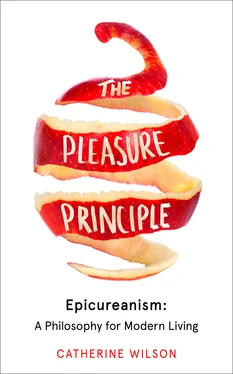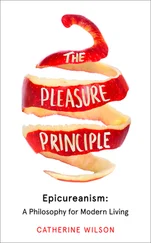The distinction between nature and convention helps to break down egocentrism and speciesism. My perceptions don’t have any special claim to objectivity, and my preferences – indeed, human desires in general – don’t deserve automatic priority over the preferences of other people and animals. The nature–convention distinction is also important for taking a critical perspective on politics, economics and social relations. In adolescence, most of us come to a point where we question the rules and structures that we have to obey and live within. Some people retain this inquisitive, even rebellious spirit for their entire lives; others decide in time that there are good reasons why things are organised and administered the way they are, or that acceptance and conformity are necessary for getting ahead in life. The Epicurean is acutely aware that our institutions and practices – our schools, law courts, police systems and government bodies – along with our ways of making things and selling them, and our expectations from marriage and family life, are conventional. We have decided that they are to take on the forms they have. At the same time, to refer to ‘our’ decisions is to gloss over the fact that the decisions that actually shape our lives are rarely made by the same people whose lives are shaped by them.
Many customs and policies that are purely conventional are assumed to be based in nature and treated as just, beneficial and unchangeable. Some examples, which I will discuss later in the book, include our supposedly natural selfishness and our supposedly unlimited desire for material goods. The assumption that acquisitiveness is a primary human drive provides the rationale for the way we organise and reward work. The supposed natural differences between men and women, in respect of their abilities, temperaments and interests, provides the rationale for giving women less of many of the things that men enjoy in greater abundance, especially social freedom and the opportunity to develop their talents and contribute to how the world is going to look and operate.
Although I have found Epicurean philosophy to be a rich source of ideas for thinking about nature, society, and personal life, the decision to write about Epicureanism for a broader readership presented a challenge nothing like the ones I was used to in my professional role.
First, in the more than 2,000 years since Epicurus founded his school of philosophy, the world has undergone a series of technological and political upheavals. We have experienced the Industrial Revolution, the agricultural revolution, the rise of global capitalism and factory labour, and the Internet revolution. We have an understanding of physics, chemistry, biology, astronomy, medicine, mathematics, engineering, computing and the social sciences that has enabled us to develop and transform our environment and to accumulate and share experiences in ways that could never have been foreseen. We can observe and communicate at the speed of light with people on the other side of the world. Could the ideas of an ancient philosopher from a time when civilisation, though not the world itself, was young, and when what expert knowledge there was lay in the hands of a small elite, really have any relevance today?
Second, Epicureanism is an optimistic philosophy, but it is not the intellectual equivalent of comfort food. Lucretius described Epicurus’s world view as bitter medicine that he aimed to sweeten through the sensuous imagery of his poetry. The Epicureans were concerned with how to think clearly and objectively about the world and about our social and political relations with one another, and they did not shrink from stating inconvenient truths. Could modern readers be persuaded that it was worth taking the medicine?
Third, the words ‘Epicure’ and ‘Epicurean’ are associated with unbridled consumption and high living. If you think visually, the first image that comes to mind might be that of a dainty, emaciated aristocrat, fussing over his wine cellar, or that of a fat, jowly, solitary diner with a voluminous napkin tucked under his chin, tackling an enormous roast. You probably weren’t thinking of a middle-aged woman who owns a bicycle and whose refrigerator at the moment contains only a few wilting green onions and half a jar of marmalade.
In fact, Epicurus did consider pleasure, including pleasure in food and drink, to be not only the main motive of our actions but also the supreme good. As he put it:
Pleasure is our first and kindred good. It is the starting point of every choice and of every aversion, and to it we come back, inasmuch as we make feeling the rule by which to judge of every good thing.
This may strike you as an unacceptably frivolous and selfish claim. What would the world look like if everybody forgot about calories, the family, sales goals, deadlines, grades, the nation, truth, honour and responsibility and instead went all-out in the pursuit of pleasure? What about the sexually transmitted diseases, overdoses and bankruptcies that would inevitably follow? What about the feelings, pleasures and choices of the sadist? And isn’t the pursuit of pleasure expensive and ecologically irresponsible?
Let me reassure you that real Epicureanism is neither frivolous nor dangerous to health, nor a threat to other people. Epicurus himself pointed out that the direct pursuit of pleasurable sensations is usually self-defeating. At the same time, he stated clearly that the best life is one free of deprivations, starting with freedom from hunger, thirst and cold, and freedom from persistent fears and anxieties. Living well requires friends to entertain and comfort us and curiosity about nature and how the world works. It doesn’t require stupendous achievement or large outlays of cash. And life can be and feel significant even without religious faith in the usual sense. Although it might seem surprising in light of the many attacks from medieval and early-modern Western theologians on Epicureanism for its atheistic framework, the Epicurean conception of the good and meaningful life can even be found in the Jewish and Christian bibles. Ecclesiastes 8:15 says, ‘Then I commended mirth, because a man hath no better thing under the sun, than to eat, and to drink, and to be merry.’ Isaiah 22:13 says, ‘Let us eat and drink; for tomorrow we shall die.’
Although Epicureanism is a way of life, this is not a lifestyle book in the usual sense. I start off with a generous helping of Epicurean physics, the theory of nature and history, with the Epicurean theory of everything. My contention is that ethical and political values are grounded in particular ways of seeing the world, about which we are normally unreflective. Philosophy brings these assumptions to the surface and makes them explicit so that they can be examined, and refined or discarded. Our choices should flow spontaneously from our examined convictions without our having to take on board and remember specific rules, including rules for living. I can’t solve for my readers all or even many of the problems of modern life, but I hope my book will help you to acquire a framework for living, not only comfortably and happily, as far as possible, but in a responsible and meaningful way.
Most of Epicurus’s original writings have been lost, though the collection destroyed in the eruption of Mount Vesuvius in 79 CE has recently been partially rescued and partially restored to legibility. I’ve drawn on the most available of Epicurus’s letters and sayings and on Lucretius’s poem, On the Nature of Things , based on Epicurus’s still mostly unreconstructed book On Nature . Bibliographical information is found at the end, along with suggestions for further reading.
PART I
How the Epicurean Sees the World
1
Читать дальше












